PES 2012 Review
Posted by
SpectralShock
on
Pro Evolution Soccer 2012 (or PES 2012, Winning Eleven 2012 for classic fans) is the annual release of the football sim game by Konami. The game has been heavily focused on improving the play on the pitch, and succeeds for the most part. Because of licensing issues, there are still only a few fully licensed leagues in the game – but there are more licensed teams than before, and all players are realistically recreated. Improved visuals and AI continue to help pushing the series forward, and it remains a good alternative for your next footy fix.
Upon launching the game, players are presented with a good set of setup screens which helps in customizing your gaming experience. All of the options are detailed with explanations, and it saves you from having to go back later and start adjusting preferences. PES once again offers a data saving system that’s confusing at first, but which also allows for quick switching between different profiles and settings. Still, there are a few too many menus to go though, and those new to the game will need time to adjust and find their way around. The lackluster design continues throughout the game – you will have to dig deep to find player ratings, and team overall ratings are also not identifiable when simply scrolling through.
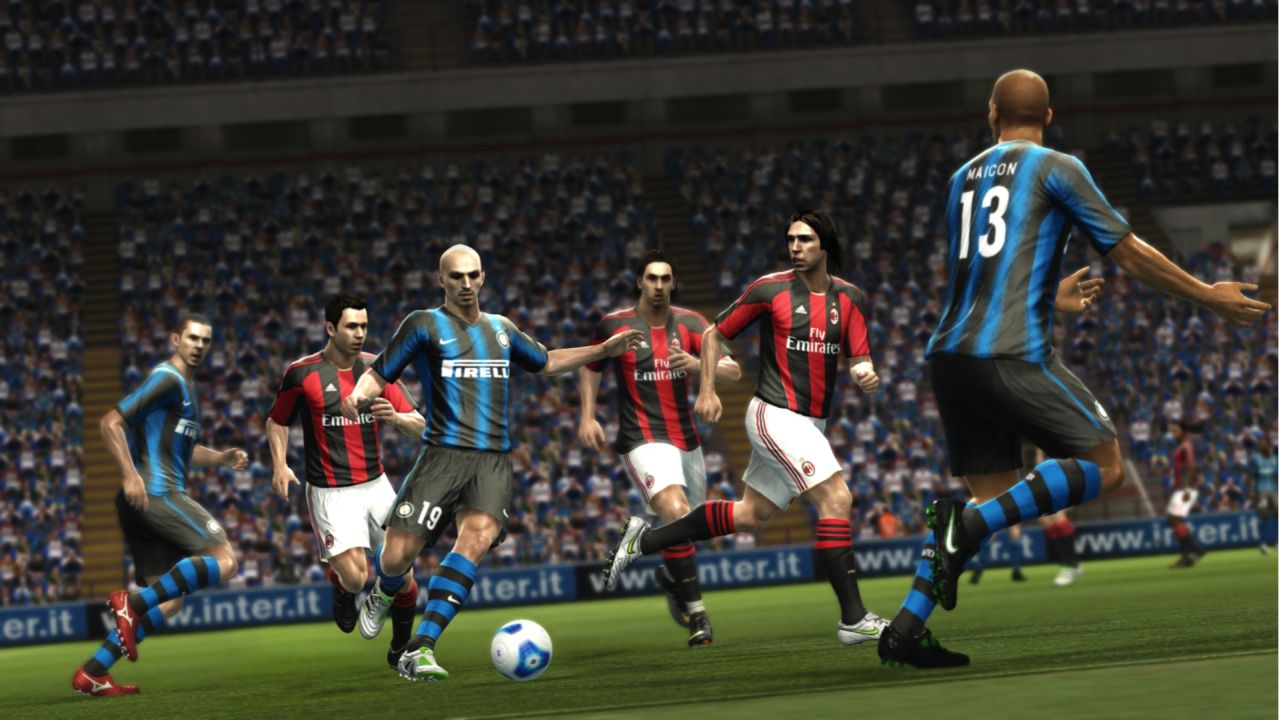
Speaking of the game’s database, perhaps the biggest drawback of the franchise has always been a lack of real teams and sometimes players. PES 2012 continues this trend, with only a few licensed leagues and teams, nowhere near the level of something like EA’s FIFA franchise. Fake team names, logos, and uniforms are all part of the course, and though it isn’t Konami’s fault, the lack of authenticity surely costs them sales every year. Thankfully, the developers have worked around this problem by offering full customization options. With a strong community following, modding PES 2012 is a possible, but lengthy process. On the up side, the EUFA-run competitions (Champion’s League, Super Cup) and all teams participating within them are fully licensed, as is the Copa Santander Libertadores. Most of the players are also in the game, so all the superstars are recognizable and accurate.
PES 2012 continues to be a feature-rich experience when it comes to gameplay modes, particularly online. In single player, the licensed EUFA and Copa Santander Libertadores competitions can be jumped into from the main menu with any participating team. Football Life now encompasses Become a Legend and Master League modes. New this year is the Training mode, which lets players get some practice with the game’s mechanics through a series of challenges. This mode is a good learning tool for inexperienced players, and also those wishing to practice advanced techniques without worrying about being in a live match.
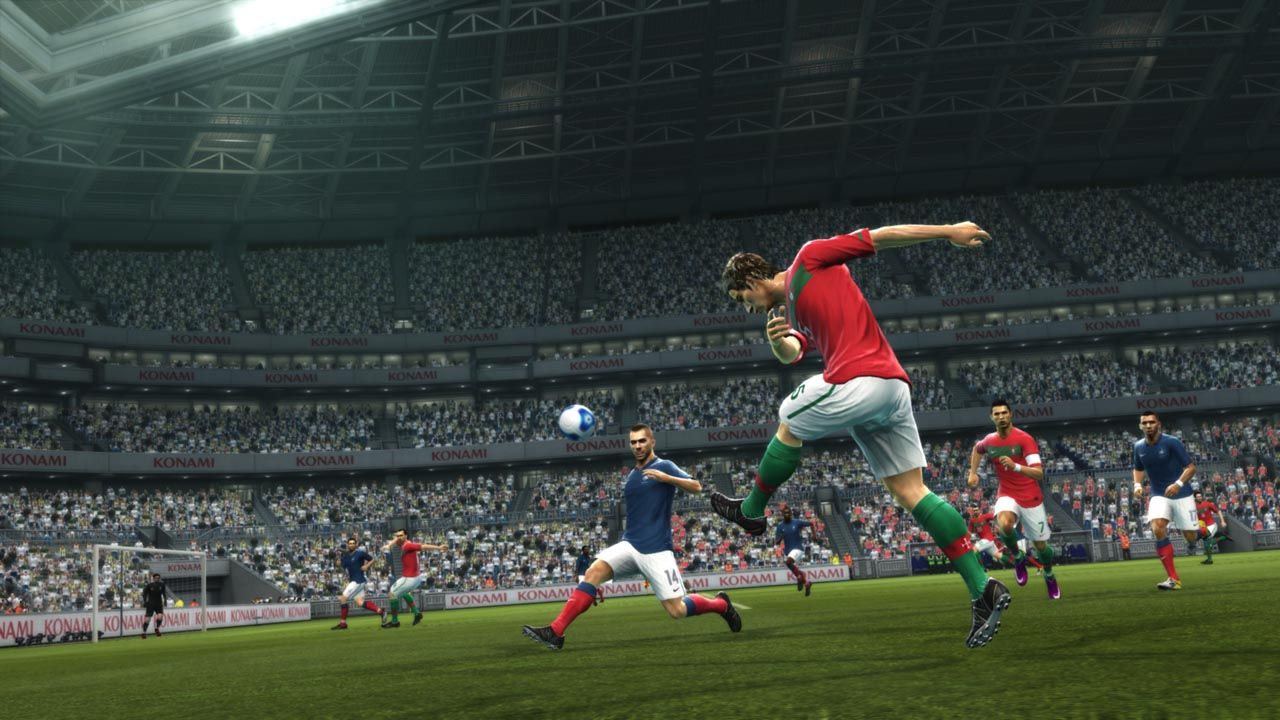
Master League is the default management mode of the game, where players can take control of a fake team and guide them to higher divisions and better players. Managing your squad, some finances and coaches is fairly straight forward, as is advancing time and playing through fixtures. The menu navigation again becomes a bit of an issue, as it’s sometimes unclear how to perform certain actions like negotiating a transfer fee. There are sometimes special challenges before certain matches, fulfilling which nets you extra bonuses and job security from the board of directors at the club. There aren’t any significant innovations in the mode, and it works well enough to get by.
Become a Legend allows players to take control of a single athlete, either existing or create their own, and play on the pitch through a career. Your agent will often deliver news and expectations from the coaches and you must do your best to play the role given. Special objectives will once again appear, allowing you to earn new skills and solidify your roster spot. In this mode, as expected, players are only in control of their character and thus cannot influence the rest of the team or coaching staff. You can, though, ask your agent for a transfer and select teams which interest you in hopes of securing a transfer. A big announce with Legend actually occurs on the pitch – if you are substituted or aren’t playing until the second half, the most you can do is speed up the match. Even with a double-speed, it’s simply boring to watch the AI play against one another, and it would have been nice to be able to simulate the match when you’re not playing.
The game also features yet another mode, Club Boss. But you won’t find it in the main menu – the mode must actually be unlocked with the artificial game points. This point system, which is easily missable and completely arbitrary, unlocks various bonuses in the game such as extra appears options for your Legend, new stadium colors, and match balls. Oddly enough, also locked away behind points are the new Club Boss mode, the ability to use a real team in Master League, and more crucial gameplay elements. It makes little sense to actually restrict players from accessing all areas of the game without first earning meaningless points, and it actually caused much frustration and Google searching before we realized how to play Master League with a real team. Similarly, Club Boss mode is new to the game, but is locked away – it must have been that the developers were not very comfortable with it. And perhaps rightly so – it’s little more than a glorified sim engine, where very few decisions can be made and no games played.
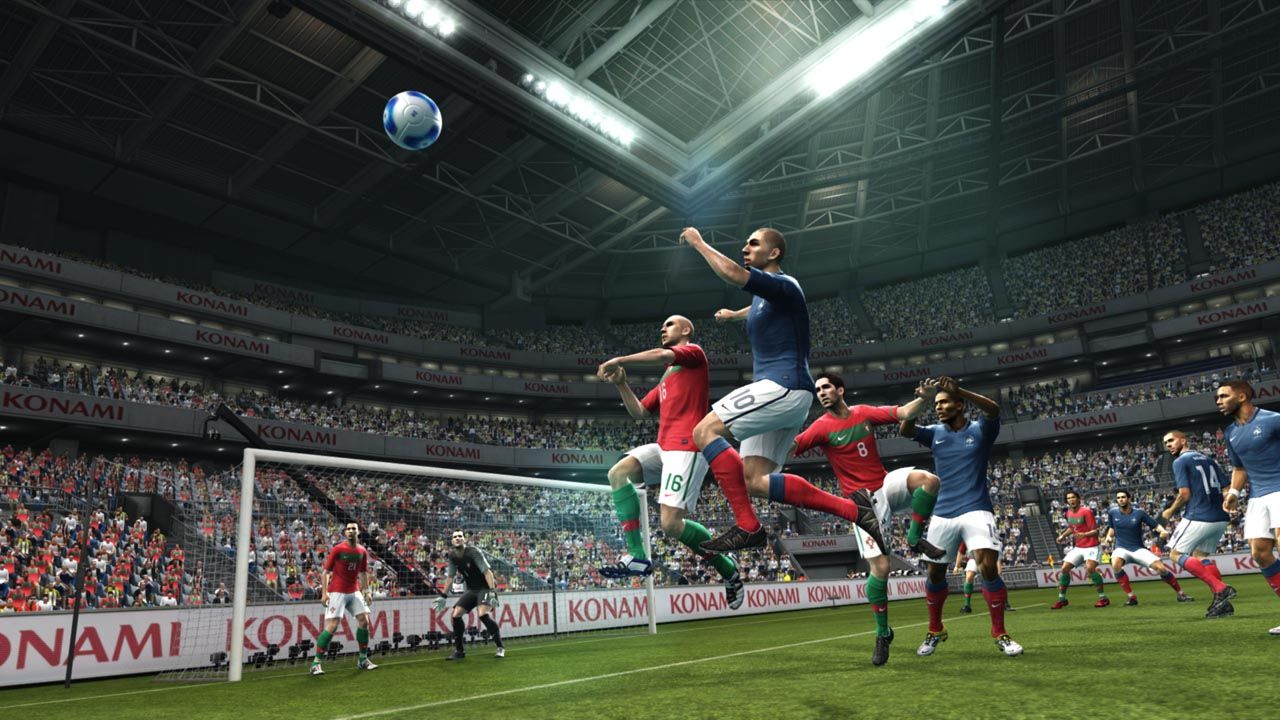
PES 2012 plays solid football at its core, but many annoyances and shortcomings often spring up during the gameplay. From the kick off, the players move about the pitch with confidence, and controlling the ball is mostly solid. However, beyond the basics, there are many small but notable issues which degrade the overall experience to just about average. To start, most players feel very similar – particularly in size, strength and speed. Sure, Ronaldo and Messi are great at ball control and their shooting is precise compared to a low-level player. Having said that, it’s nearly impossible to outrun any of the defenders in the game even if you have a head start – they will most always catch up. This is a problem that existed in PES 2011 and seemingly hasn’t been addressed. When challenging for the ball, the outcome is often random and irrelevant to the players’ physical attributes. And even in general, sprinting feels rather slow, and using an advanced technique only knocks the ball way too far ahead. Given that the defenders catch up to said loose ball almost at the same time as you do – your skill and speed makes little difference.
Goaltenders’ reactions are often underpowered, letting in many easy shots, and some of them due to bad decision making. For example, a defender safely clears the ball with a header away from the penalty area – but behind him, the goalkeeper is diving anyway, though the ball has no possible way to end up in his grasp. The follow-up shot, of course, finds the goalie out of the net for an easy score. There are many goals which go in very awkwardly, whether it’s from poor AI or bad ball physics. Out in the field, almost all manual tackles result in fouls, often even if the ball was won fairly. There seems to be some notable problems with the refs in general – attackers often get called for fouls for barely touching the defender while trying to make some room on the attack. Penalties are called when, in replay, the defender clearly wins the ball. On the other hand, you can completely destroy players with a sliding tackle after they’ve passed the ball, and nothing ever gets called. The advantage rule is never used, because fouls are often called right at the sight of a tackle.
On the field of play, the starting eleven on both teams also have some issues. Passing works fine, though the players don’t have much tendency to intercept even when they are clearly in position to do so. That seems to be a common problem – the passing seems very cold and calculated, as even your own teammates will rarely touch a loose ball unless it was originally passed to them. Animation of the players is easily learned, and thus you’ll know exactly when to dribble or turn away from a challenge. One-touch plays are inconsistent at best, as even the skilled players often fail to shoot on the volley or miss completely.
Speaking of controls, they are very sensitive. All players have a power bar which ranges from blue to red color, for both passing and shooting, as well as set pieces. The bar fills with relatively decent speed, however it seems severely overpowered. There is no point to ever get into the yellow or red zone, because those shots/crosses will simply fly way out of the field. It makes you doubt why the power bar wasn’t tweaked better, because you will never use it even close to full capacity for any shots, passes or crosses. On a corner set piece, for example, getting it to over half way means it will likely land at the far end of the penalty box, at best. Just tapping the shot button will still make Messi miss a wide open goal by miles on the volley.
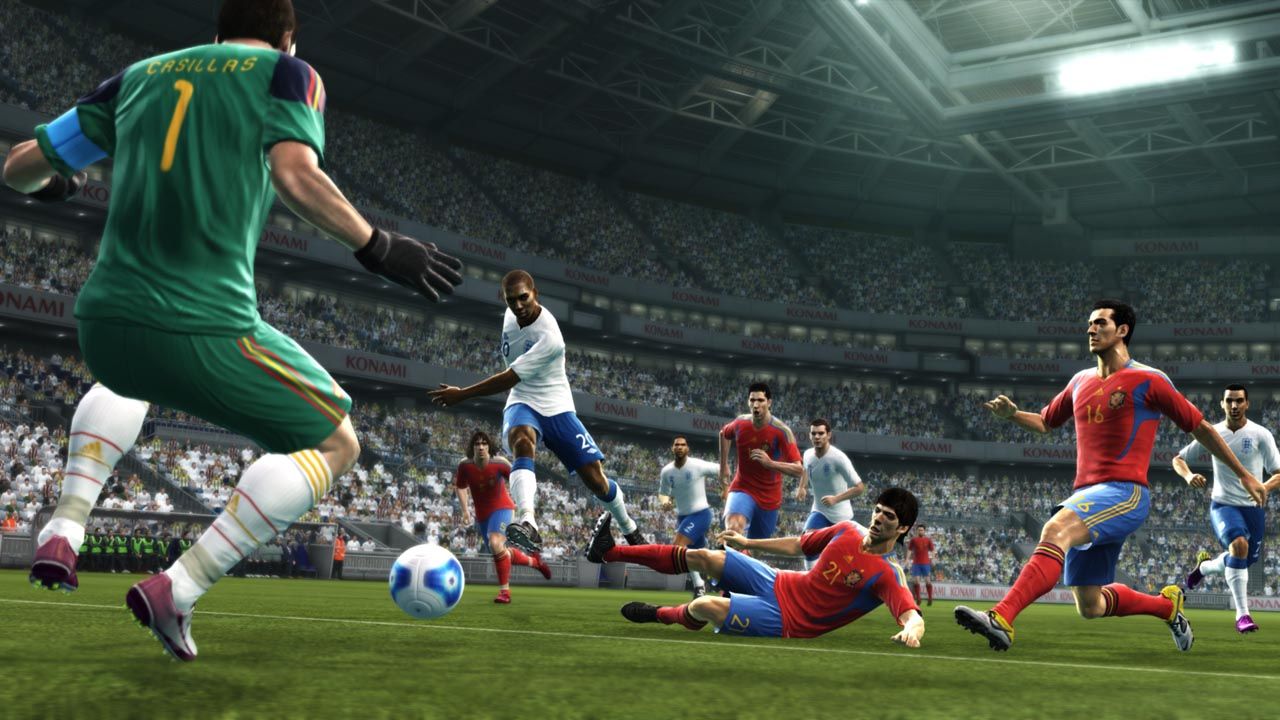
One new aspect that has been added to the on-field play this year is the ability to control another player. Titled Teammate Control, users can control a secondary player which allows you to place your AI for support exactly where you need it. Everything from defending in pairs to making runs can be completed by controlling your AI teammate. Having your teammate run circles around the defense to get into space and receive the pass from your currently controlled player is a great feeling. The system does come with a fairly steep learning curve, but those who perfect it will be at a huge advantage, particularly online.
A wealth of multiplayer modes is included in the game, with everything from simple quick ranked matches to online communities and tournaments. With communities, players are able to start public or private groups where users can interact via a virtual message board, play against each other and versus rival communities. The level of interaction is quite impressive and things are surprisingly well laid out in the menus. Master League online presents you with a chance to play in an organized online league against other players, for the duration of seasons. You have control over your squad, with ability to buy and sell players on the virtual transfer market. The mode is very similar to its offline counterpart, which makes it seem rather impressive to be played online. Legends mode can also be played online, where everyone only controls one player on the pitch. Hourly tournaments also exist, where each season begins on the hour and players must win a certain amount of games to earn enough points to advance to the playoffs.
An incredibly annoying problem with Online Tournaments is that you can start a game at any time, but if the match isn’t finished when the clock hits the hour mark, the game actually boots you from the match and says that qualification is over. It’s obvious that a lot of matches might run into this problem because they begin at quarter to an hour or so, and it is understandable that the match shouldn’t count if it runs past the hour, but to kick players out mid-game is simply a terrible design decision. Developers should note to users in-game that their current match won’t count towards the tournament because the hour has passed, but let us finish the game for goodness’ sake.
Online play is stable in general, and features some nice quirks. Text chat is available, so you can throw taunts or suggestions for your opponents. Pausing the game gives a very safe 90 second window to do whatever is needed, which is a nice change from FIFA’s 30 seconds and players don’t seem to abuse it. The quick chat option which comes up during replays is also neat, but awkwardly placed right on the game screen, making it hard to see the actual replay. Playing online is relatively free of lag, but there seems to be a real lack of players – matchmaking would often find users from another continent altogether.
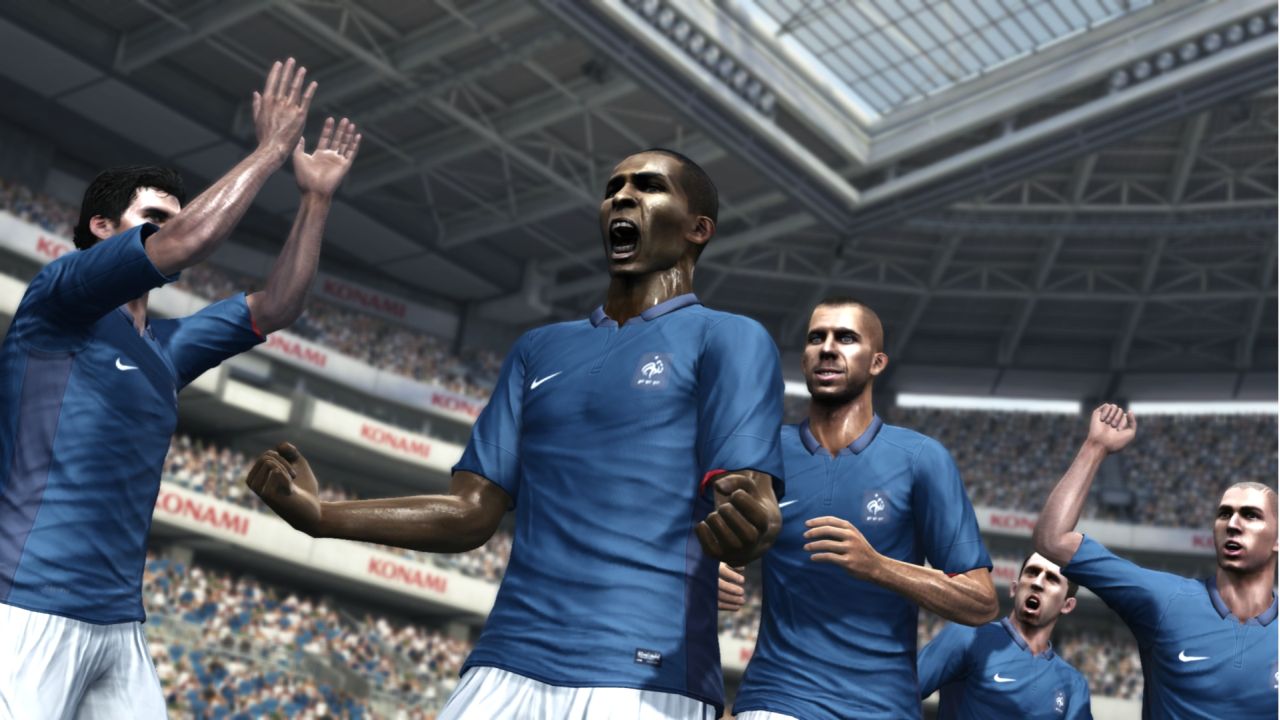
In contrast to FIFA’s somewhat cartoonish presentation, PES 2012 attempts to employ full visual realism. From authentic EUFA presentations to very life-like looking player faces and emotions, the developers did a good job on this front. The offline play in Legends and Master League includes many cutscenes that take place outside the field of play, such as press presentations, board room settings, and the locker room. These add a very good touch of atmosphere to the experience – even if they are limited and begin to repeat after a while. On the pitch, the cutscenes are actually minimal, instead the game has an annoying habit of making a replay out of every goal and opportunity, forcing you to endlessly hit the skip button. Commentary during play is fairly basic and actually begins to repeat itself due to limited number of lines. The soundtrack during menus is rather quirky, ranging from hard rock to electronic tunes, and with only a small song selection overall.
There’s no doubt that PES 2012 is a step above its predecessor, but it’s also clear that the series has some ways to go yet. The single player game modes remain functional, but there’s nothing truly groundbreaking or exciting compared to last year’s effort. Online modes offer a wealth of options, with decidedly impressive competitive play structure in Master League and Legends, but a lack of online players is a concern. The game’s visuals are solid, but an odd and short soundtrack and limited commentary impact the overall presentation somewhat negatively. A lack of licenses has always been a concern for the series, but with many tools available to edit the game to your liking, this shouldn’t be a problem for dedicated fans. PES 2012 is an improvement over last year, but these are short strides that aren’t enough to make the title anything more than a good alternative – and it’s just that, an alternative.
